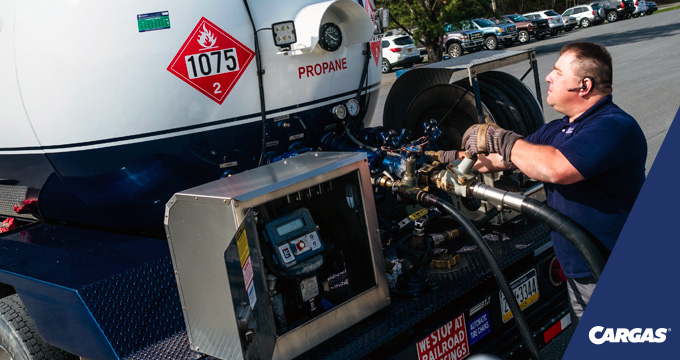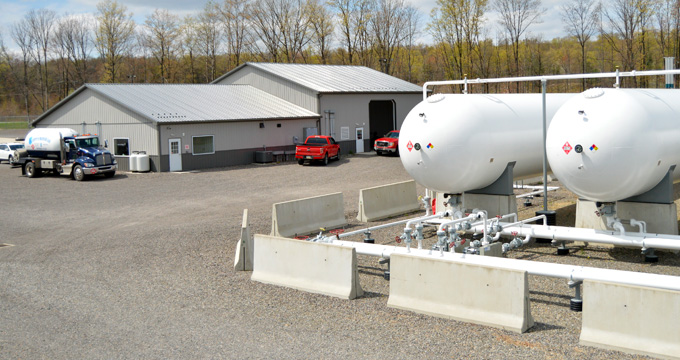How Fuel Dealers are Keeping Employees Safe While Still Serving Customers

As an essential business, fuel dealers have been given the incredible responsibility of maintaining operations during a national crisis, all while looking out for the health and safety of their employees and their customers.
But how do you continue delivering quality customer care when you can’t physically interact with your team or your customers? We asked our customer base how they’re handling the current situation. Below is the advice they had to offer fellow fuel dealers.
PERC also shared some great ideas that you can check out here.
Close Your Offices to the Public
Limit the use of your office to employees only. If customers or vendors are used to coming to your location to drop off payments or submit invoices, post notices at your doors and set up drop boxes to collect physical materials.
This is a great time to encourage customers to take advantage of services like a customer portal or autopay. If customers don’t want to sign up for these services, encourage payments over the phone, especially for COD customers.
If possible, set up a drive-thru window or curbside service for your storefronts.
Limit Employee Contact
Allow anyone who can work remotely to do so. If you use cloud or web-based software for your business, it’s likely your entire staff can work remotely. If you have wireless dispatching capabilities, your drivers and technicians can receive routes and work orders without coming into the office.
If your office software is installed on computers or local servers, ask your IT provider for help setting up laptops and VPN connections for your employees. Set up call forwarding for your office phones, or consider sending them home with your employees.
Support your employees with information about setting up their home offices, managing their home internet speed, and cybersecurity precautions they should take.
Explore products like Slack, Microsoft Teams, or FreeConferenceCall.com, which are available for free or for free trials, to support your remote workers.
Consider having one person staff each office to support remote teams by scanning/emailing hard copy documents, printing documents, or checking the mail. Your team could also split into shifts working different hours or different days. Make sure each shift team is equipped to manage the business on its own in case other teams need to go into quarantine.
When working in your office, spread out and avoid contact. Use email, chat, or phone to communicate, even if you’re in the same building.
As cleaning supplies are available, regularly disinfect your office space, including work surfaces, shared spaces like kitchens and bathrooms, door handles, light switches, and keyboards. Remind employees to wash their hands regularly throughout the day. Here’s a great tutorial on how clean every area of your hands when washing.

Equip Your Team
To limit contact between customers and service technicians, carefully evaluate each in-home service appointment. Use your customer service team to communicate with customers about technicians in their homes and reschedule appointments as needed. You may choose to postpone any in-home service work unless it’s an emergency.
Empower your technicians to make decisions about entering customers’ homes based on what they observe and their comfort level. If an employee feels unsafe, encourage them to stay in their truck or van and have dispatch or your customer service team communicate with the customer and evaluate the situation.
For customers who can’t make payments by phone or email, ask them to leave payment outside for your drivers. If payment isn’t there, use dispatch or your customer service team to communicate with the customer rather than having your driver do so on-site.
Similarly, don’t leave delivery tickets on-site for customers—transition customers to electronic invoices.
As available, equip your delivery drivers and technicians with hand sanitizer or disinfectant.
Communicate Clearly to Customers
Given these unprecedented circumstances, customers understand the way you do business is going to change. But it’s important to clearly communicate what is changing, how it will impact their service, and what your expectations are for customers moving forward.
Let customers know about changes to your business hours, new methods for making payments or requesting deliveries, efforts to reschedule service appointments, and how to get in touch with you. Consider setting up a new email address for customers to ask questions or express concerns about the current situation.
Your customers will look for information in different places, so be sure to cover all your bases when communicating. Add a letter to printed mailings, post on your website and social media channels, update your Google My Business account, and email your customers.

Communicate Clearly to Your Team
Make sure your team understands how your organization is handling the current situation and what your expectations are of them. Make sure each team member understands what his or her duties are, especially if working remotely.
Set up regular calls with your management team to keep everyone on the same page. Individual branches or teams may also want to set up regular meetings. Even if you’re reporting that nothing has changed, consistent communication will ensure your team doesn’t feel isolated and help them feel heard.
Educate your team about the situation, how you are responding as a business, and what they can do to stay safe and healthy. A little bit of (appropriate) humor can help everyone focus on the positive side of things. Consider asking your management team to send messages of encouragement and support.
Most important, everyone on your team must communicate openly and honestly about possible exposure to the COVID-19 virus. Make sure anyone who is feeling sick knows they should stay home.
Plan for Downtime
Limiting deliveries and service calls may mean downtime for your team. Make a plan for when things are slow. You can line up spring cleaning projects or work on tasks that have been on your wishlist. For remote employees, allow them the flexibility to do other things like get outside or spend time with family.
Focus on the Positive
Remember that this is an opportunity to come together and help people. In many cases, customers are relying on you to keep their homes, businesses, or farms operational. By continuing to do what you do, you are supporting other people and businesses.
Thank you!
We believe the energy industry is unique. So many fuel delivery companies grew out of family-owned businesses with exceptional values and community and customer focus. We have watched this business community come together in a time of crisis to support each other and your customers. We are honored to serve an essential industry, and we thank you for everything you’re doing!